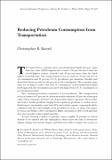| dc.contributor.author | Knittel, Christopher Roland | |
| dc.date.accessioned | 2012-12-07T19:13:14Z | |
| dc.date.available | 2012-12-07T19:13:14Z | |
| dc.date.issued | 2012 | |
| dc.identifier.issn | 0895-3309 | |
| dc.identifier.issn | 1944-7965 | |
| dc.identifier.uri | http://hdl.handle.net/1721.1/75296 | |
| dc.description.abstract | The United States consumes more petroleum-based liquid fuel per capita than any other OECD high-income country—30 percent more than the second-highest country (Canada) and 40 percent more than the third-highest (Luxembourg). The transportation sector accounts for 70 percent of U.S. oil consumption and 30 percent of U.S. greenhouse gas emissions. Taking the externalities associated with high U.S. gasoline consumption as largely given, I focus on understanding the policy tools that seek to reduce this consumption. I consider four main channels through which reductions in U.S. oil consumption might take place: 1) increased fuel economy of existing vehicles, 2) increased use of non-petroleum-based, low-carbon fuels, 3) alternatives to the internal combustion engine, and 4) reduced vehicle miles traveled. I then discuss how these policies for reducing petroleum consumption compare with the standard economics prescription for using a Pigouvian tax to deal with externalities. Taking into account that energy taxes are a political hot button in the United States, and also considering some evidence that consumers may not "correctly" value fuel economy, I offer some thoughts about the margins on which policy aimed at reducing petroleum consumption might usefully proceed. | en_US |
| dc.language.iso | en_US | |
| dc.publisher | American Economic Association | en_US |
| dc.relation.isversionof | http://dx.doi.org/10.1257/jep.26.1.93 | en_US |
| dc.rights | Article is made available in accordance with the publisher's policy and may be subject to US copyright law. Please refer to the publisher's site for terms of use. | en_US |
| dc.source | AEA | en_US |
| dc.title | Reducing Petroleum Consumption from Transportation | en_US |
| dc.type | Article | en_US |
| dc.identifier.citation | Knittel, Christopher R. “Reducing Petroleum Consumption from Transportation.” Journal of Economic Perspectives 26.1 (2012): 93–118. | en_US |
| dc.contributor.department | Sloan School of Management | en_US |
| dc.contributor.mitauthor | Knittel, Christopher Roland | |
| dc.relation.journal | Journal of Economic Perspectives | en_US |
| dc.eprint.version | Final published version | en_US |
| dc.type.uri | http://purl.org/eprint/type/JournalArticle | en_US |
| eprint.status | http://purl.org/eprint/status/PeerReviewed | en_US |
| dspace.orderedauthors | Knittel, Christopher R | en |
| dc.identifier.orcid | https://orcid.org/0000-0002-7654-8641 | |
| mit.license | PUBLISHER_POLICY | en_US |
| mit.metadata.status | Complete | |
